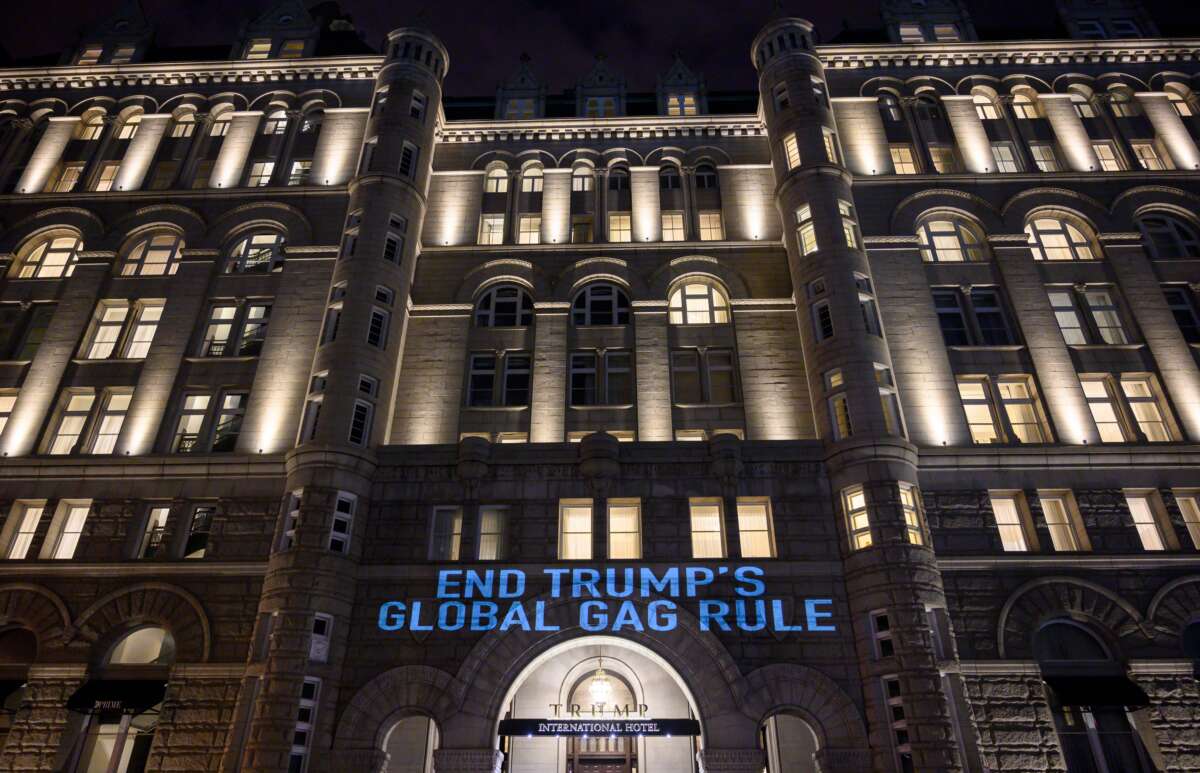Did you know that Truthout is a nonprofit and independently funded by readers like you? If you value what we do, please support our work with a donation.
It has been two years since the US Supreme Court blew up federal protection for abortion, handing states the power to enact abortion bans and realising the decades-long fever-dream of anti-rights actors.
Though a minority in the US, these extremists are loud and determined and won’t stop at our borders. Their plans for the future are outlined in Project 2025, which is already being implemented in the US and abroad through anti-abortion and anti-LGBTIQ+ initiatives and would be fully executed if radical conservative forces reclaim the White House.
While political ads have featured Project 2025, no one is talking about the profound global impact of this manifesto. It would revive anti-gender US human rights policy frameworks like the Commission on Unalienable Human Rights and the Geneva Consensus Declaration, favouring anti-rights alliances and networks with other authoritarian regimes. Essentially, this amounts to a gutting of the Universal Declaration of Human Rights, the cornerstone of multilateral engagement for the past 76 years.
Project 2025 would also reinstate and expand the anti-abortion foreign policy known as the Global Gag Rule (GGR) to all US foreign assistance. The rule, which was repealed in 2021, bans foreign non-governmental organisations (NGOs) that receive US global health assistance from providing legal abortion services or referrals and advocating for abortion law reform.
This implicates upwards of $51bn, assuming US foreign assistance holds somewhat stable, which is not guaranteed. The architects of this agenda would take a transactional and punitive approach to multilateralism, putting at risk the US’s entire $18.1bn contribution to the United Nations. Particularly vulnerable are the US’s $122m contribution to the World Health Organization and $32.5m to the United Nations Population Fund – which aims to improve reproductive and maternal health worldwide – as well as other UN agencies that were targeted by the 2017-2021 administration.
“Protecting life,” according to Project 2025, “should be among the core objectives of the United States foreign assistance”. It goes on to urge the United States Agency for International Development to stop “supporting the global abortion industry”.
Project 25 seeks not only to reinstate the GGR — which is also known as the Mexico City Policy — but to expand it so that it also applies to multilateral organizations, foreign governments, and US-based NGOs. This would be the most significant expansion of the GGR since it was enacted 40 years ago during the Reagan administration.
This would all be on top of the existing Helms Amendment which is particularly egregious and has been in place since 1973. Though the Helms Amendment prohibits only the use of US foreign aid for abortion as a “method of family planning”, the policy has in many countries been used to implement a total ban on abortion services, including in instances of rape, incest, and life endangerment even in humanitarian settings.
Helms has contributed to maternal deaths that disproportionately impact women of colour, and to the stagnation of maternal mortality rates globally. According to a Guttmacher Institute analysis, there could be approximately 19 million fewer unsafe abortions and 17,000 fewer maternal deaths each year if Helms were repealed.
The thing is, Project 2025 isn’t something that will happen in the future. As Robin Marty, who runs a clinic that had been the main abortion provider in Alabama, told the New York Times: “…That is what is happening here. We are Project 2025.” And no matter who wins the election, Christian nationalism is growing within the United States, and this has global repercussions. We ignore it at our peril.
The fall of Roe v. Wade was an extreme example of what a very loud minority has been working toward for decades – limiting access to abortion, taking away bodily autonomy and undermining human rights.
This same extremism is exported around the world and just like in the US, it is forcing people to endure even greater hardships just to access essential health care. It is costing lives, risking health, and compromising people’s futures. Imagine the impact globally if foetuses are given the same rights as women.
As former US President Obama said at the Democratic National Convention in Chicago last week about the US Presidential election: “The world is watching.”
Reproductive justice is a global, human rights issue, and the US shares space with nearly 200 other nations. What happens here matters to the planet. And while the world doesn’t vote in US elections, there is, and will be, a rippling international impact.
As we fight for reproductive freedom for all in the US, so must we fight for reproductive freedom for all around the world.
A terrifying moment. We appeal for your support.
In the last weeks, we have witnessed an authoritarian assault on communities in Minnesota and across the nation.
The need for truthful, grassroots reporting is urgent at this cataclysmic historical moment. Yet, Trump-aligned billionaires and other allies have taken over many legacy media outlets — the culmination of a decades-long campaign to place control of the narrative into the hands of the political right.
We refuse to let Trump’s blatant propaganda machine go unchecked. Untethered to corporate ownership or advertisers, Truthout remains fearless in our reporting and our determination to use journalism as a tool for justice.
But we need your help just to fund our basic expenses. Over 80 percent of Truthout’s funding comes from small individual donations from our community of readers, and over a third of our total budget is supported by recurring monthly donors.
Truthout’s fundraiser ended last night, and we fell just short of our goal. But your support still matters immensely. Whether you can make a small monthly donation or a larger one-time gift, Truthout only works with your help.
